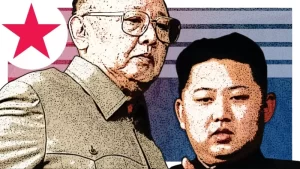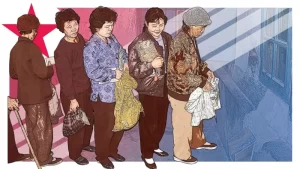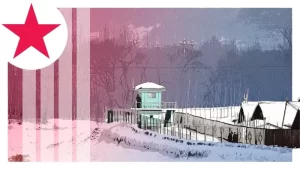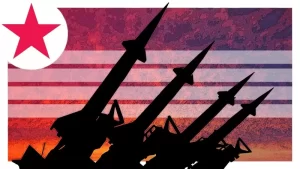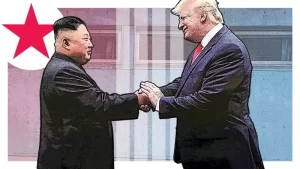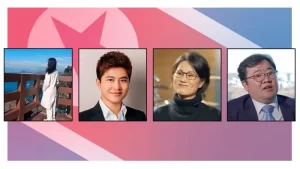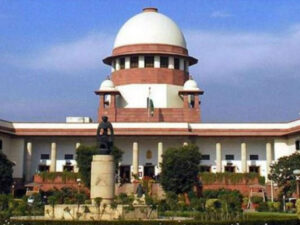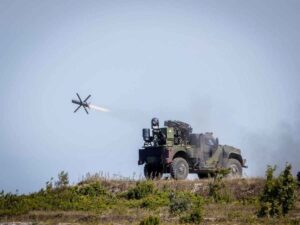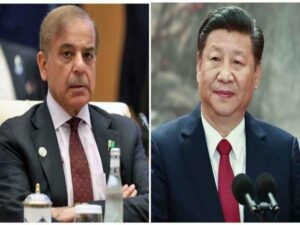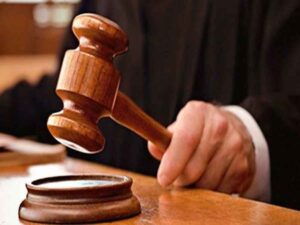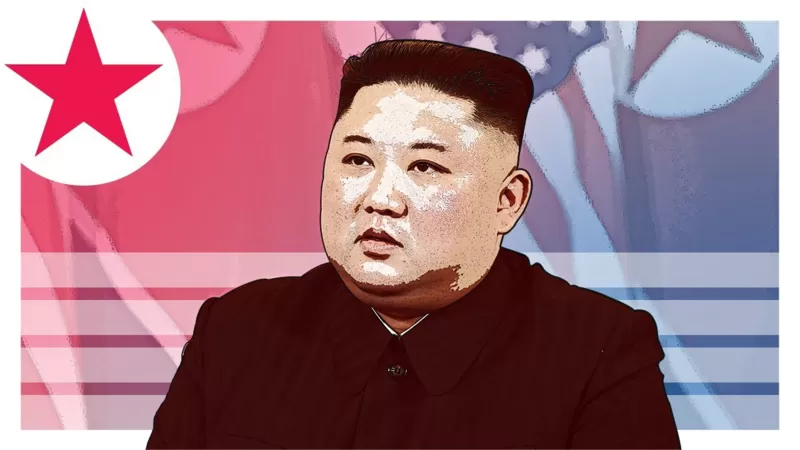
It has been 10 years since a 27-year-old clumsy man took power in North Korea, and during this time only a few world leaders have made as much headlines as him. But what was it like to live under Kim Jong Un’s rule?
The streets of Pyongyang were filled with people crying.
Students wearing school uniforms were knee-deep in sorrow. In sorrow, women were seen with their hands on their chest.
North Korea’s tightly controlled state media announced that their “beloved leader” Kim Jong Il had died at the age of 69. The date was 19 December 2011.
Korean affairs experts around the world began to search their files to know about a person.
At the age of just 27, he was the so-called great heir. But few people thought that he would be successful in anything. How could a society given preference to age and experience be ruled by someone who did not have either?
Many predicted a military coup, or a power grab by the North Korean elite. But the world had underestimated the young dictator. Kim Jong Un not only strengthened his grip, but he has also started a new era called “Kim Jong Unism”.
He turned his attention to foreign affairs, starting with the elimination of his rivals and the execution of hundreds of people. Four nuclear tests, 100 ballistic missiles fired and talks with the US President made international headlines.
But their relentless desire for nuclear weapons has paid off. North Korea is now in trouble, poorer and more lonely than when it took power.
- So how was it to be under his rule?
Ten North Koreans who left the country—including one of their top diplomats—recount the 10 years of Kim Jong Un.
- A New Beginning
Student Kim Geum-hyeok did something on the day of the death of Kim Jong Un’s father, for which he could be shot. He had a party.
He says, “It was very dangerous. But we were very happy at that time.”
For him, a young new leader, especially one who loved skiing and basketball, gave hope for new thinking and change.
He says, “We had expectations from Kim Jong Un. He had studied abroad in Europe, so we thought maybe he would think like us too.”
Geum Hyok was from an aristocratic family and was studying in Beijing at the time, a special opportunity that only a few North Koreans get.
Life in China opened his eyes to a world full of more possibilities and he scoured the internet to find news about his country.
“At first I couldn’t believe it. I was sure Westerners were lying about what kind of country North Korea was. But my heart and my mind were divided. My brain said you didn’t need to look, But the heart wanted to see more.”
North Korea’s 25 million people are strictly controlled, so most have little or no knowledge of world events, or what the outside world thinks of their country.
They are also told that the leader is like an omnipotent and omnipotent deity who deserves his full loyalty.
For Geum Hyok, this young man’s succession to power was a sign of something that was available in very limited quantities.
- doubters
But others were skeptical. There were discussions in the corridors of power in Pyongyang that Kim Jong has inherited power, but he is not worthy of it.
Ryu Hyun-woo, the former North Korean ambassador to Kuwait, told the BBC he was angry at the handing over of leadership from father to son.
“The first thought that came to my mind was ‘Oh, another heir?’ The North Koreans were tired of dynastic succession. Especially among the elite, we wanted something new and unique. We thought, ‘Shouldn’t something be different?’
The Kim family has been ruling since North Korea came into existence in 1948. The people of the country are told that this lineage is divine. It is a way of legitimizing the lineage.
“I heard things like, “So we’ll always be serving the most beloved leader, right?’
“What would a 27-year-old know about running the country? This is stupid.”
- a promise
The new leader, in a speech in 2012, vowed that the North Korean people would never need to “tighten their belts again”.
For a country that suffered a devastating famine in the 1990s that claimed millions of lives, their new leader seemed to want to end their food shortages and their suffering. It was a great moment.
State Department officials were ordered to raise more international investment. Some people within the country also saw the change.
Driver Yoo Seong-joo, who lives in a province on the country’s east coast, says he has noticed that supermarkets have started showing more products made in North Korea.
“To our surprise and pride, North Korean food products were actually better than Chinese products in terms of flavour, packaging and supply. It was really a pride boost.”
- complete destruction
Kim Jong-un’s best wishes for his people were not for those he considered a threat.
In particular, his uncle Jang Song Thaek had built up a powerful network of allies.
Businessman Choi Na Rai, who lived near the border with China, hundreds of miles from Pyongyang in the north of the country, thought that Jang Song would become the country’s new leader.
“Many of us hoped that the borders with China would open and we would be able to travel abroad freely,” he recalls.
“We used to think that if Jang Song Thaek succeeds in taking power, he will bring about a lot of economic change in North Korea. Of course we could not say this in front of everyone, but we had such hopes.”
Such rumours were strangled.
Jang Song Thaek was called “human feces” and “worse than a dog” and then given the death penalty for allegedly defaming the “unitary leadership of the party”.
The young leader had shown a glimpse of his cruelty.
- Control
Dozens of people fled across the border to China and eventually to South Korea in an attempt to save lives from the elimination campaign.
Kim Jong Un decided to prevent further discontent in the future. Border security has been tightened more than before. Along with the barbed wire fencing, screws were laid on the ground.
While working as an agent during that time, Ha Jin Woo managed to expel about 100 people from his North Korea.
“There is a separate border guarding force in the country. They have been told to shoot anyone who tries to cross the border and they will not be held responsible.”
“When I first started I was very scared but doing it out of duty. When I was young I had many questions about North Korea. I was worse than an animal. Why am I born here to live in someone who has no rights and freedoms? I had to risk my life to do this work.”
But eventually he hit the target and had to run away. His mother was imprisoned in a prison camp and was paralyzed by the harsh punishment there.
This bothers Jin-woo, who now has little memory of her mother’s voice.
- Mr Popular
Despite cracking down on opponents and swingers, King Jong Un tries to appear more accessible, more modern, and more sociable than his father.
He married a fashionable girl, Ri Sol-joo. In the journey of all the towns and villages, they are photographed hugging, shaking hands, smiling. Roller coaster rides, skiing, horse riding are seen.
The couple visited cosmetic factories and displayed luxuries.
But it was forbidden for ordinary North Koreans to try to be more “modern”.
Eun Mi-soo wanted to follow the fashion seen on DVD smuggled from South Korea. She was desperate to wear earrings, necklaces or jeans.
“I was once caught for not following the rules and put on a public shaming stad for public shaming where crowds of people were verbally scolding me and I cried. They were saying “You are corrupt, why are you not ashamed?”
Like Kim Jong-un’s wife, Hyun-young was a singer. But he had to glorify the North Korean leader in all the songs. When he tried to revolt, he was prosecuted.
“I was never given the freedom to do what I wanted to do artistically. North Korean music had too many rules and regulations and I had to suffer a lot.
“The government controls it because they are afraid of foreign influence. These strict rules show that they are not confident in their own governance.”
According to a recent human rights report, at least seven people have been sentenced to death over the past decade for viewing or distributing pop videos from South Korea.
Kim Jong Un describes this foreign effect as “poisonous cancer”.
- bang bang
Every ballistic missile test made headlines around the world but they did not instill national pride in the country as it was intended.
One critic says, “People will say that they are still making weapons by squeezing people’s blood and sweat.”
Another critic says, “We didn’t consider it a victory. We thought wow, they spent so much money on these tests. All the money we make for them is being spent on this.”
Around the year 2016, new orders were given to Ambassador Ryu at the Foreign Embassy. The focus was no longer just on business.
“We had to explain why North Korea needs nuclear weapons, its purpose and justification.”
It was hoped that this idea would take shape within the international community as diplomats talked about it.
- Rocket Man’s Big Gamble
The escalating tension between US President Donald Trump and Kim Jong-un ended on a diplomatic show.
The dictator, often seen with jest in Western media as a fat spoiled child, was confidently sharing the stage with the US president.
Photos of shaking hands in Singapore were featured prominently on the front pages of North Korean newspapers.
But the restrictions imposed to curb the country’s nuclear program were beginning to show effect, although the reaction in villages far from Pyongyang for fear of Kim Jong’s image was silent.
“We didn’t have the ability to analyze its meaning,” says businessman Choi Na-rye.
But no deal was struck, and Ambassador Ryu believes it was all a sham to get some relief from restrictions.
“North Korea can never give up these weapons because it considers them necessary for the survival of the government.”
- covid crisis
The worse was yet to come for Kim Jong Un.
In January 2020, when the Covid epidemic engulfed neighboring China, North Korea closed its borders. Not only for the people, but also for the business.
Food grains and essential medicines gathered at the main entrance of Dandong, which were unable to go. More than 80% of the country’s trade is done with China.
“Since Covid, a lot has changed.” This is to say of Joo Seong, who is a driver in North Korea. He had managed to talk to his mother for some time near the border with China.
“The economy is shrinking, inflation has gone up. Living has become very difficult. My parents are getting food but the price is too high. It’s a lot of pressure. The situation seems dire.”
There are reports that some people are dying of hunger.
Kim Jong Un himself called it a “huge crisis” and even burst into tears in a speech. This is a unique thing for a North Korean leader.
There, a former doctor, Kim Sung-hui, says that most of the medicines have to be bought from the black market.
Operation theaters often run without electricity and surgeons sometimes operate with bare hands as there are no gloves.
“When I look at how different the two countries are on this peninsula, I expect a time in North Korea when the human rights of both patients and doctors are guaranteed.”
North Korea was not prepared for an epidemic and the impact of Covid on government health service is not known.
But it also cannot escape the great loss of its people from its current self-clad isolation.
- kim’s hold
Some disgruntled citizens who spoke to us were so emotional about the current situation in North Korea that they predicted a coup. But there are no such signs it seems far-fetched.
The Kim family’s hold has proven to be widespread and remarkably durable. All predictions of the government’s withdrawal have turned out to be wrong.
- The dissidents who spoke to the BBC for this article
Having been cut off from the world for more than 70 years, most of my interviewers said they wish North Korea would open its borders, allow its people to move freely. Many people only want to see their family again.
These people are free to raise their voices and tell stories from their lives about the regime of Kim Jong Un. But those who are left behind do not have such freedom.
Singer Hyun-hyung says, “Singing for myself is something I’ve risked my life for.” “Those who remain in North Korea will have to bury it in their chest until they die.”
On the 10th anniversary of his rule, Kim Jong Un is the charioteer of his country in crisis. It has dozens of new nuclear weapons, but its people are still hungry.
A huge poster was put up in the center of Seoul shortly after the South Korean president’s visit to Pyongyang in 2018. It was a photo of Kim Jong-un showing fingers and thumbs held together, which became a symbol of love in K-pop.
I wrote at that time that with a single gesture of those fingers, Mr. Kim could have changed the lives of his people.
He could have given them freedom. He has that power.
Instead, North Korea’s 25 million people are more isolated from the world than ever before.
All these interviewees risked their lives to leave North Korea and now live in South Korea and America. Some of these names have been changed to protect their families.

